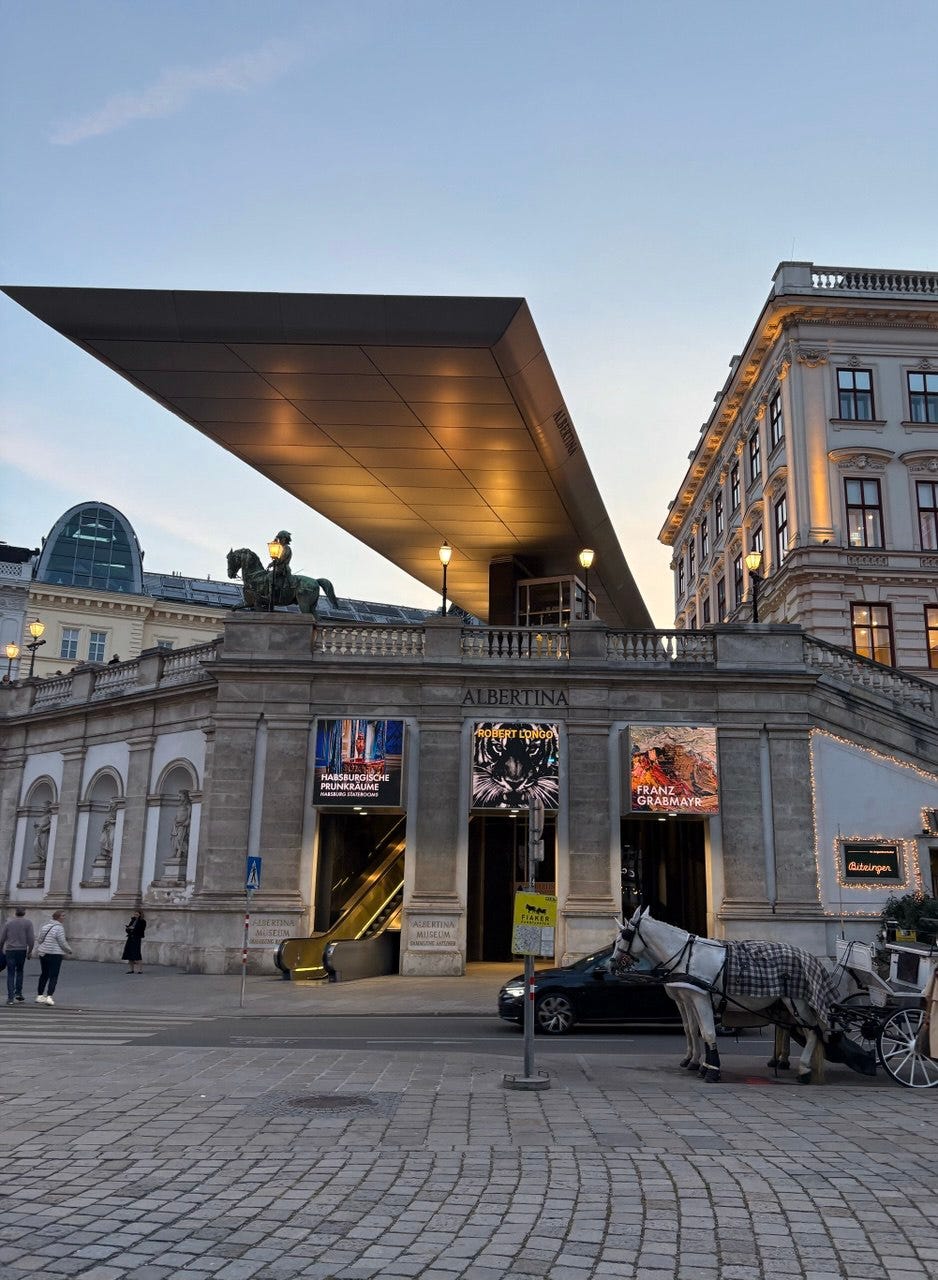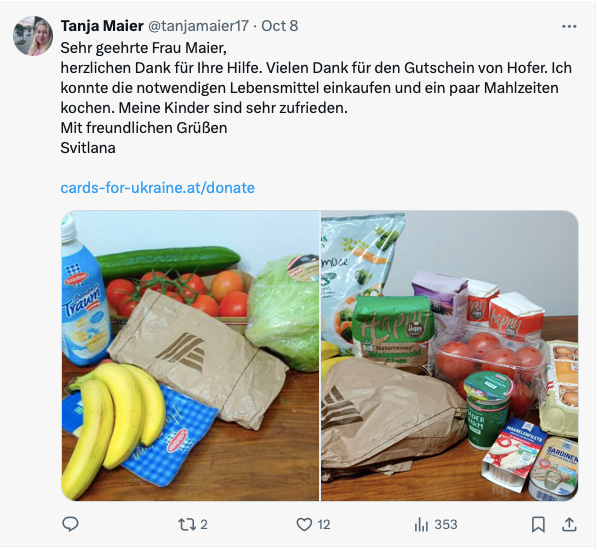The Wait
The world waits to see what will happen in the U.S. in November. Here in Austria, we are also waiting to see who will build the next governing coalition. An update from the ground plus what to read.
First, an apology. I started a new writing project in early September, and clearly my cerebral capacities have been focused on that, as I am finding it challenging to bring you anything “new” here. I will share more on that project when I am ready to ask for help to bring it to a wider audience. For now, I have passed a few copies onto trusted reader friends, in the hope that they will tell it to me straight.
Here in Austria, it is a strange feeling, as the election took place in late September, and we still don’t know which parties will come together to build the next federal governing coalition. The first place finishing far right FPÖ is getting louder in its demands that someone considers partnering up with them. For now, the second place conservative party ÖVP is saying it will not, but this might be a game of playing hard to get for the public. They ran on a campaign of promising not to buddy up to the far right, but in several federal states, including an election this weekend, they have done just that. I have no means of reading the tea leaves, but I do still think it would be highly problematic should a government be formed excluding the winning party. Yes, it has been done before, but this time I fear that electorate could be mobilised and perhaps even violently. Social media is a powerful tool, as the Trump era has taught us. So for now, we wait, and life goes on. Sometimes I wonder who is in charge at all.
The Guardian published a nice roundup in English about the state of politics in Austria recently.
We are also all now waiting to see what will happen in the U.S. in November. The polls look close, although they do seem to indicate Harris has a slight edge. But polls have been wrong before, and if the vote really will come down to a few ten thousand voters in Pennsylvania, I wouldn’t have a clue how to wager which way that would go. The New York Times’ podcast The Daily ran some interesting episodes this week on the very tight races in both the House and the Senate, and what that could mean for whoever is the future president. TL;DR — Montana will determine the Senate, were a homegrown Democrat is fighting, and looks to be losing, to a rich Republican transplant from out of state. If you watched Yellowstone, it sounds like the show come to life. Congress will come down to the big coastal states, New York and California, where Republicans may do a better job of showing up to vote driven by issues they care about (illegal immigration, the economy), more so than Democratic voters whose issues, like access to abortion care, are ‘safe’ (for now, provided federal laws don't change) in those blue states.
Nate Silver published his election forecast on Sub-stack, and also went live yesterday (I did not manage to listen to the entire conversation). “Pure tossup territory” sounds like the best TL;DR I can think of.
I would like to recommend some more reading on Russia, but unfortunately they are behind paywalls I don’t have access to. But knowing the authors and the material, I am sure they will be worth your time should you have access.
Arkady Ostrovsky of the Economist just published a long piece, Escape from the Meat Grinder, the story of a Russian propagandist turned soldier turned deserter. I would even go out and buy the print edition to read this. Maybe I will be lucky and find it in a bookshop later today. He also has a podcast, A Farewell to Arms, (subscription only) on the same story.
Peter Pomerantsev also just published a new piece in Foreign Affairs, Putin's Greatest Weakness, To Break the Kremlin's War Machine, the West Must Exploit the Grievances and Fears of Ordinary Russians. The link I have shared is hopefully beyond the paywall. The article argues that public support for Putin’s war is at a new low, especially after the Kursk invasion. However, it makes the assumption, from a western perspective, that public opinion in Russia matters. I am not sure that it does. Russia is one of the most passive places on the planet when it comes to civic action, as everyone knows what happens to those who do try to rock the boat (Navalny et al). What I think is perhaps more interesting is the rumblings I hear privately from those who are still somehow based in Moscow — that the money you see is essentially wealthy living off of their savings, that beyond the war there is little real money to be made now. I am more inclined to believe you have to watch Russians’ wallets. Having said that, important to remember the bonuses being paid for enlisting in the army plus the huge deficit of “male” workers in defence industry factories etc means that for the average, ordinary Russian living somewhere in the provinces, his ability to make money has increased significantly since the war started. So while the globe-trotting elite may be annoyed, and inconvenienced by sanctions, I am still not convinced the truly average Russian is fed up. But again, now way to measure this accurately. This is all just talk.
A very interesting thread was published this week by Ruth Deyermond about how we got here, with decades of underestimating Russia by American leadership. I would agree with much of what she says. American companies floated in when they thought there was big money to be made in Russia, treated Russia like a junior partner, and American policy makers never fully grasped the humiliation that was the fall of the Soviet Union for KGB alumni like Putin, and how much they want to take revenge and remind the world of Russia’s “power”. They do not think in economic terms; they think like 19th century tsars.
I think it is fair also to assume that no matter who is elected to the White House in November, the war in Ukraine is not going to be on the top of anyone’s policy list “to do’s”. I read this morning that Biden will meet with the leaders of France, Germany and the UK in Berlin on Friday. Perhaps his administration is trying to achieve what it can with the weeks it has left.
I am deeply skeptical, on a personal level, when I hear Ukraine’s “victory plans”, as the news from within Ukraine is bleak. Territory being lost, mandatory evacuations of new areas, electricity cuts going into winter, and even rounding up men at a recent rock concert in Kyiv. We read in our group chats here in Austria about new arrivals, and although I do not have any official figures I could share with you, I would expect these numbers to rise as the temperatures drop. Even Austrian media recently published a long read on expectations of a “hard winter” in Ukraine. The willingness to welcome civilians and make timely preparations here in Europe on a government level is now a fraction of what it once was. Time is still on Russia’s side.
Here in Vienna, I hear from individuals, and each story is different. I met recently with a mom and daughter, both hearing impaired. The mother can read lips, the daughter, 23, cannot, and only communicates with sign language. The daughter is eight months pregnant and there is no father in the picture. The father (soon to be grandfather) has a job, and is working here. The mother would love to also work, but due to her limited German and hearing impairment, no one wants to hire her. Thankfully, medical care here is covered for Ukrainians by Austria’s public health insurance, but even something so simple as “you can only have one person with you at the birth” is a complication but she will need two: one to translate from German to Russian/Ukrainian, and her mother to translate those words into sign language. We spoke with a doctor who said they could make an exception. I am not sure I have the stomach to witness a birth, but I promised the mom she could call me when the time comes. The 23yo, bless her, has bambi eyes about the whole upcoming experience.
I met recently another family with a 15yo daughter with several cerebral palsy. She is the size of a second grader. She underwent a complicated surgery in Vienna one year ago, and will soon have another surgery to remove metal implants. She is receiving exceptional care given a very difficult medical situation. Her family was given an apartment to live in outside of Vienna but a kind, private donor, and that same donor also employed the father in his family business. The dad has a job, and I cannot tell you how much this changes a family’s perspective when they can provide for themselves. The family also qualified for state payments for the caretakers of handicapped relatives, a program which always existed in Austria but it took a Ukrainian mother in Salzburg to take it to the Supreme Court to prove that Ukrainians too should have access to these payments. The mother tells me how hard her days and nights are. It is like caring for a newborn for fifteen years. The family also have a younger daughter.
Many Ukrainians are busy applying for a new residency card status in Austria which is available to those officially employed and earning enough to meet the criteria. The flurry of interest indicates that many families now see their future here and not in Ukraine. If you want to know what that means for Ukraine, ask the Balkans, especially countries like Bosnia, who have been bleeding population to higher salaries in the EU ever since the wars ended.
We at Cards for Ukraine continue to help, but it is really only a fraction of what we once did. We send what we can when we can, but we too are limited to the generosity of private individuals, and unlike a first response, the problems many face now are inherent and systemic.
In the back of my mind is the memory of the late Christopher James, and wondering what we should do with the holidays coming up. I need to think a bit more, to ask what we could do for the kids or the elderly, a way that we could help while at the same time letting the Ukrainians do it themselves for each other. We are at that point where there are many here perfectly capable of now being able to give back to those just arriving now. For those who waited all this time in Ukraine, and only now decided to leave, the road to Europe will be just so much harder. There is no more cheap housing, social housing is full, the willingness to help, the public sympathy is simply not there like it was when we were bombarded with horrible images on a daily basis of civilians feeling bombs. And yet the bombs are still falling.
I ask everyone, “when will it end?”, and no one has an answer.
I am off this weekend to the Balkans, and perhaps will be back next week with an update from there. If I can be convinced to get back on the plane once I have been reunited with the Adriatic…






